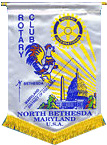
Last Week’s Speaker, Henry Coppola of Montgomery Parks, mentioned new exercise equipment in Rock Creek Park. Here’s one of the stops for “Stabilizing & Balance” located near Kensington Parkway. If you’re in the neighborhood, why not get out there and try a couple of “Plank With Same-Side Knee Tucks!”
Joe Kravitz, one of our newer members, gave an interesting talk about his life, his views on dentistry, and many other things. He is a native of Pittston, Pennsvylanvia,and attended the University of Maryland Dental School. In addition, he has a M.S. in Oral Biology from the University of Maryland and a Fellowship in Implant Dentistry from NYU College of Dentistry. As an observer of nature and results, Dr. Joe has developed and written about his simple implant techniques in the scientific literature. He has authored “3 Minute Implant” which describes the process for you, as well as a book about preventing dental disease called “Dirty Mouth.”
Internships for Montgomery County Public Schools